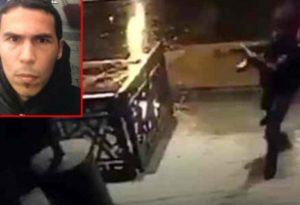Abdullah Bozkurt/Stockholm
A Chinese fighter for the Islamic State in Iraq and Syria (ISIS) of Uyghur origin who was connected to one of the deadliest terrorist attacks in Turkey was out in the streets to support Turkish President Recep Tayyip Erdoğan during a false flag coup bid in 2016.
According to court transcripts, Abuliezi Abuduhamiti, a 39-year-old jihadist, said he responded to the call of President Erdoğan, who asked supporters to mobilize in the streets on July 15, 2016, and underlined that his allegiance lay with the Republic of Turkey.
“I was in and out of Syria illegally in April 2015. My friends in Syria called me and said: ‘You’ve been tormented there [in China]. Come here, and if you want to go to China and do something, get weapons training here first. When you go to China, you can do something.’ So I went to Syria with the idea of doing something in the future against Chinese persecution. I stayed there for 15 days and came back [to Turkey],” he told the court in December 2017.
“I am a person who took to the streets at the urging of President Erdoğan during the July 15 coup attempt. I have a strong sense of Turkishness. My allegiance is with the Republic of Turkey,” Abuduhamiti added.
Abuduhamiti further noted that he was with the Sultan Abdulhamid Han Brigade in Syria, which is supported by Turkey.
Confidential police records, a copy of which was obtained by Nordic Monitor, reveal that Abuduhamiti, who carries a Chinese passport numbered G36157861, was detained on December 16, 2016 in Ankara. When he was taken into police custody, Abuduhamiti was waiting at the main bus terminal to receive a Sig Sauer P226 handgun sent from Konya province, a stronghold of Erdoğan’s ruling Justice and Development Party (AKP) and active with al-Qaeda and ISIS cells.
The police document, dated June 6, 2017, shows that Abuduhamiti was already under investigation before a bloody New Year’s Eve attack by Isis on İstanbul’s Reina nightclub in which he was implicated but authorities had failed to crack down on the ISIS cell’s activities. It is possible that the deadly terrorist attack on New Year’s Eve could have been prevented if the Turkish investigators had mapped out Abuduhamiti’s connections and started arresting his associates.
Two weeks after his detention in Ankara, Abuduhamiti associate Abdulkadir Masharipov carried out the Reina nightclub attack, killing 39 people. The attack was claimed by ISIS. A report by the Financial Crimes Investigation Board (MASAK) prepared as part of the investigation into the Reina attack revealed that Abuduhamiti had wired $947 to a man named Navruz Kasymov, an ISIS militant who was detained while attempting to cross into Syria and released in Turkey in March 2016. Abuduhamiti appears to have been a money man who funded ISIS operations inside and outside of Turkey.
Kasymov, 32-year-old Russian national of Kyrgyz origin, came to Turkey on February 10, 2016 and attempted to cross into Syria along with 16 other foreign ISIS aspirants. He was detained again on November 22, 2016 in a separate investigation.
Turkish police document showing that Abuliezi Abuduhamiti was detained two weeks before the deadly Reina nightclub attack in Istanbul on January 1, 2017:
In the aftermath of the Reina attack, Turkish authorities announced they had arrested two Chinese nationals of Uyghur origin, namely Omar Asim and Abuduhamiti. It was a strange announcement given the fact that Abuduhamiti had been taken into police custody two weeks before the Reina attack. That means he had already been released after being caught with a handgun at the bus station, or that the authorities simply kept him in detention long enough to make the announcement in the aftermath of the Reina tragedy. In either case, it is certain that Turkish authorities knew about Abuduhamiti and his ISIS connections before the Reina attack took place.
Abuduhamiti’s confession indicating that he was out on the streets to support Erdoğan on July 15, 2016 confirms widely reported claims that Turkish intelligence agency MIT mobilized jihadist and radical groups on the night of the coup to create a chaotic scene. The jihadist groups, armed, funded and supported by MIT, work under senior intelligence official Kemal Eskintan, who has been running the special operations section of MIT for the last couple of years.
Turkish intelligence chief Hakan Fidan also admitted in a statement to parliament that he met and dined with Ahmad Moaz Al-Khatib Al-Hasani, the then-president of Turkish-backed opposition group the National Coalition for Syrian Revolutionary and Opposition Forces. Mehmet Görmez, the head of Turkey’s Religious Affairs Directorate (Diyanet), also joined the dinner held at the intelligence agency’s headquarters in Ankara’s Yenimahalle district.

The Diyanet played a crucial role on the night of the coup when tens of thousands of mosques were ordered by Görmez to make religious calls from the minarets in support of the Erdoğan government. The scheme, apparently planned long before the limited mobilization of the Turkish army, was cited as yet more proof that the attempted coup was planned by President Erdoğan.
It has been widely reported that SADAT, paramilitary units operating under retired Col. Adnan Tanrıverdi, who later became chief military advisor to President Erdoğan; operatives of Turkish intelligence agency MIT; and some violent religious groups had organized and killed people during the events of July 15. Turkish authorities did not investigate any of the killings despite the fact that autopsy reports and ballistic tests showed that many were killed by bullets not used by the Turkish military.
Erdoğan called the failed coup “a gift from God” and launched a massive purge of judges, prosecutors, academics, teachers and civil servants, imprisoning tens of thousands of people who had nothing to do with the coup. US-based Turkish Muslim scholar Fethullah Gülen was blamed for the coup, despite the fact that Gülen strongly denied involvement and the government failed to present any evidence proving that Gülen ordered the coup.
Nordic Monitor has previously published revelations of a former prisoner who claimed that Masharipov told him he was asked to provide evidence against Gülen in exchange for better prison conditions. The prisoner, who was briefly in solitary confinement next to Masharipov’s cell in İstanbul’s Silivri Prison, said Masharipov told him and other inmates that officials who were interrogating him wanted him to testify that was instructed to attack the nightclub by Gülen. He was reportedly promised better conditions in prison.












